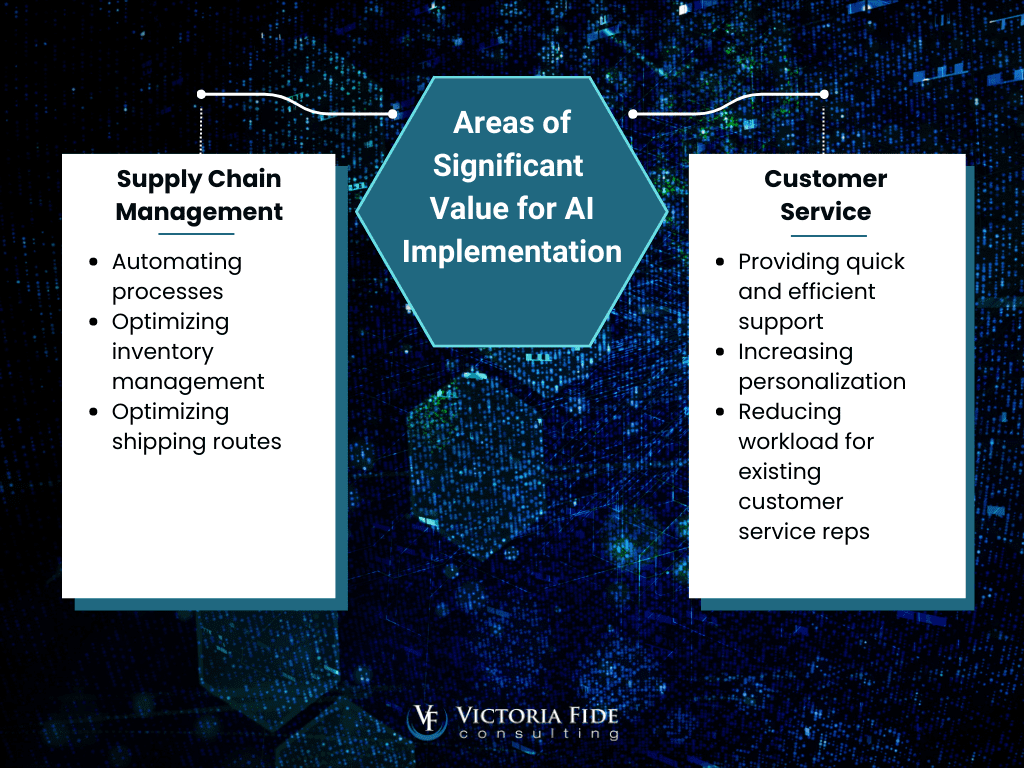
The advent of artificial intelligence (AI) has transformed the way that businesses operate in virtually every industry, from manufacturing and logistics to retail and healthcare. AI has enabled companies to optimize processes, reduce costs, and enhance customer experiences.
As a result, businesses that have embraced AI are creating significant value, and those that have yet to do so risk being left behind.
Table of Contents
AI and Supply Chain Management
One area where AI is driving digital transformation is in supply chain management. Supply chains are complex systems involving many stakeholders, from suppliers and manufacturers to distributors and retailers.
Historically, managing supply chains has been a manual and time-consuming process, requiring significant resources and human expertise. However, AI has the potential to transform supply chain management by automating many of these processes, enabling faster and more accurate decision-making and improving overall efficiency.
One way that AI is transforming supply chain management is by optimizing inventory management. AI algorithms can analyze historical sales data and other factors to predict future demand. This enables businesses to optimize inventory levels and reduce the risk of stockouts or overstocking. Optimizing inventory can lead to significant cost savings and improved customer satisfaction, as businesses can better meet customer needs while minimizing waste.
AI is also driving the digital transformation of logistics and transportation. For example, AI algorithms can be used to optimize shipping routes and reduce delivery times. This can improve efficiency and reduce costs, as businesses are better able to manage their transportation networks and deliver goods more quickly.

AI and Customer Service
Another area where AI is creating significant value is in customer service.
AI-powered chatbots and virtual assistants are increasingly used to interact with customers, providing quick and efficient support while reducing the burden on human customer service representatives. These systems can be programmed to answer common questions, provide product recommendations, and even assist with purchases, enabling businesses to provide a more personalized and efficient customer experience.
In addition to improving existing processes, AI enables new business models and revenue streams. For example, businesses can use AI-powered analytics to identify new market opportunities, predict customer behavior, and develop new products and services. This can lead to new sources of revenue and a more competitive position in the market.
Challenges in Successfully Implementing AI
However, while the potential benefits of AI are significant, there are also challenges that businesses must address to implement AI successfully.
One of the critical challenges is data quality, as AI algorithms require large amounts of high-quality data to be effective. In addition, businesses must have the technical expertise to implement and maintain AI systems and address ethical concerns related to the use of AI, such as data privacy and bias.
To get started with using AI for digital transformation, businesses should begin by identifying areas where AI can provide the most value.
This might involve conducting a comprehensive assessment of current processes and identifying areas where AI can be used to automate or optimize operations. Businesses should also ensure that they have the necessary data infrastructure in place to support AI applications and the technical expertise and resources to implement and maintain AI systems.
In addition to technical considerations, businesses must address cultural and organizational challenges to successfully implement AI. This might involve creating a culture of innovation and experimentation and providing training and resources to help employees adapt to new technologies and ways of working.
From optimizing supply chains and improving logistics to enhancing customer experiences and developing new revenue streams, AI can transform how businesses operate and compete in the market. To realize these benefits, businesses must be strategic in their approach to implementing AI. They must address both technical and organizational challenges to ensure success.
By automating processes and enabling faster and more accurate decision-making, AI has the potential to create significant value and competitive advantage. However, many businesses need help figuring out how to get started with using AI for digital transformation.
Key Considerations for Implementing AI in Your Business

Let’s explore some key considerations and best practices for implementing AI in your business.
1. Identify Areas of Opportunity
The first step in implementing AI is identifying areas where it can provide the most value. This might involve conducting a comprehensive assessment of your current processes and identifying areas where AI can automate or optimize operations. For example, look for areas where AI can help with demand forecasting, inventory management, or supply chain optimization. Alternatively, consider using AI for customer service, marketing, or product development.
2. Build a Strong Data Foundation
AI algorithms require large amounts of high-quality data to be effective. As such, building a solid data foundation to support AI applications is essential. This might involve collecting and analyzing data from various sources, such as sales data, customer feedback, and social media. It’s also important to ensure that your data is accurate, complete, and up to date, as this will ensure that your AI algorithms can make accurate predictions and recommendations.
3. Select the Right Tools and Platforms
Many different AI tools and platforms are available on the market, and choosing the right ones for your business is essential. This might involve selecting a platform that supports your specific use case, such as demand forecasting or inventory management. It’s also important to consider factors such as ease of use, scalability, and cost when selecting an AI tool or platform.
4. Invest in the Right Talent
Implementing AI requires a team with the right skills and expertise. This might involve hiring data scientists, machine learning engineers, and other technical experts who can help build and maintain AI systems. It’s also important to invest in training and development to ensure your existing employees have the skills and knowledge needed to work with AI technologies.
5. Ensure Ethical and Responsible Use of AI
As with any new technology, it’s crucial to ensure that AI is used in an ethical and responsible manner. This might involve addressing data privacy, bias, and fairness concerns. It’s also essential to ensure that your AI systems are transparent and explainable, so stakeholders can understand how they work and the decisions they make.
6. Start Small and Iterate
Finally, it’s important to start small and iterate when implementing AI. This might involve piloting an AI application in a specific area of your business before scaling it up to other areas. It’s also important to iterate and refine your AI systems over time, based on feedback and results.
By identifying areas of opportunity, building a solid data foundation, selecting the right tools and platforms, investing in the right talent, ensuring ethical and responsible use of AI, and starting small and iterating, businesses can successfully implement AI and realize its benefits. While implementing AI can be complex and challenging, by following these best practices and working with experienced partners, businesses can achieve success with AI and drive digital transformation.
But as we discuss AI, we can’t forget the concept of machine learning.
Machine learning is a subset of artificial intelligence (AI) that allows computers to learn from data and improve over time. In recent years, machine learning has become increasingly crucial for businesses looking to adopt new technologies and drive digital transformation.
Here are some of my favorite ways that machine learning aids in the adoption of new technologies by businesses:
Automating Repetitive Tasks
One of the key benefits of machine learning is that it can automate repetitive tasks that employees would otherwise perform manually. This includes data entry, image and speech recognition, and natural language processing. By automating these tasks, businesses can free up their employees to focus on more strategic and value-added activities.
Improving Decision-Making
Machine learning algorithms can analyze large amounts of data and provide insights and recommendations that would be difficult or impossible for humans to identify. For example, machine learning can be used to predict customer demand, identify patterns in consumer behavior, or optimize supply chain operations. By improving decision-making, businesses can make more informed and data-driven choices, improving efficiency, reducing costs, and increasing customer satisfaction.
Enabling Predictive Maintenance
Machine learning can also be used to enable predictive maintenance, which involves using data to identify when equipment is likely to fail and proactively performing maintenance to prevent downtime. Using machine learning to predict maintenance needs, businesses can avoid unexpected downtime, reduce repair costs, and improve equipment reliability.
Streamlining Quality Control
Machine learning can automate quality control processes by analyzing data to identify defects or errors. This can be particularly useful in manufacturing, where defects can be identified and corrected in real time, reducing waste and improving overall product quality.
Facilitating Personalization
Machine learning can be used to analyze customer data and provide personalized recommendations and experiences. For example, machine learning algorithms can analyze customer purchase history and browsing behavior to provide tailored product recommendations or personalized marketing messages. By delivering personalized experiences, businesses can improve customer loyalty and increase sales.
Optimizing Inventory Management
Machine learning can optimize inventory management by predicting demand and optimizing inventory levels. By using machine learning to predict demand, businesses can ensure they have the right products in the right quantities at the right time, reducing the risk of stockouts and overstocking.
By automating repetitive tasks, improving decision-making, enabling predictive maintenance, streamlining quality control, facilitating personalization, and optimizing inventory management, machine learning can help businesses drive digital transformation and achieve competitive advantage. However, it’s important to note that implementing machine learning can be complex and challenging, and businesses should work with experienced partners to ensure that they are using machine learning effectively and responsibly. Nevertheless, with the right approach, companies can successfully implement machine learning and achieve significant value and growth.
In conclusion, AI and machine learning are powerful tools that can aid in adopting new technologies by businesses and further support digital transformation.
About the Author
Shana Gibbons is the Warehousing and Supply Chain Business Process Consultant at Victoria Fide Consulting. She has over 16 years of experience working in the Supply Chain and Warehousing space, and she is deeply passionate about building relationships with her clients and teams in order to help them navigate through their Warehouse and Supply Chain ups and downs.
